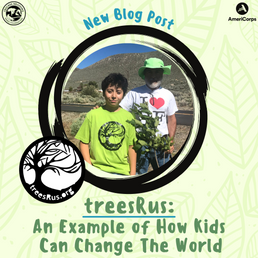Science for a Sustainable Future
- Sarah Holcombe, Development Director
- Jul 8, 2021
- 3 min read
In this week's blog, Development Director Sarah Holcombe interviews Naturalist Educator Kristina Lee about how science and sustainability go hand-in-hand, both at our Summer Science Camp and in the daily lives of our students outside of camp.
We are passionate about teaching science, because we are also passionate about sustainability. With one-third of Washoe County fifth graders not meeting science standards, the Parks Foundation works year round to offer STEAM (Science, Technology, Engineering, Arts, and Math) education to students who currently don’t have access. Through our Student Stewards program, the Parks Foundation is able to connect with and educate thousands of students yearly about the exciting world of science, and generate curiosity at a young age about how to best care for this planet we are all sharing. As we are running our Student Stewards Summer Camp, a quote from Baba Dioum, a Senegalese forestry engineer, rings in the ears of one of our educators, Kristina: "In the end we will conserve only what we love; we will love only what we understand; and we will understand only what we are taught." We know our young students are the ones that will be creating a sustainable future for us all, and we are excited to share how we practice sustainability, while teaching science! Sitting down with Kristina, we learned why teaching science at a young age is important and some awesome science experiments you can do at home while practicing sustainability!
Sarah: What makes you excited about being an educator with the Truckee Meadows Parks Foundation?
Kristina: I really enjoy being an educator because all it takes is a tiny spark to get kids interested in so many different topics! For instance, who knew looking for crawfish and learning facts about them could be so fun? I love that the kids we work with mirror our enthusiasm for the environment and they really want to learn even on the toughest days. This makes us want to be the most creative we can be when making lesson plans that are fun learning experiences for our awesome student stewards.

Sarah: How do you and the other educators incorporate upcycling and sustainability within your lessons?

Kristina: In the past year as an educator on the SSP team, I have seen upcycling at it’s finest! We’ve been saving toilet paper rolls, plastic bottles, cardboard, paper and other various materials. SSP shows local students how they can be stewards of their parks and open spaces in ways that I never got to experience as a child. This program not only teaches students about science, but allows them to get a fun experience and do some critical thinking along the way. SSP also practices what we preach, by saving paper, plastic, cardboard, and other materials to re-use in our lesson plans and various camps.
Sarah: Okay, now the question we’ve all been waiting for. What experiments can we do at home by using up-cycled material?
Kristina: Some of our favorites are Soil Sam! And “Pretend” Binoculars.
Soil Sam! Activity (15 Minutes): Use an upcycled plastic container to hold soil and plant grass seeds to grow “Sam’s” hair. Useful to observe how the grass grows in the soil to make its home there. Have your future scientist draw/write what they think will happen with “Soil Sam” in a notebook and document Sam’s progress. For more soil experiments for kids, click here.
Pretend Binoculars Activity (15 Minutes): Use paper towel rolls and string. The binoculars can be decorated with stickers, markers, etc. Even though the binoculars are pretend, the students can have fun using them for bird watching or to help spark their imagination. Click this link for step-by-step instructions.
The valuable lessons taught to our students are making a difference in the future of our community, and we see it everyday. Whether teaching the preciousness of our resources through a geology lesson or learning about wind power through a wind turbine experiment, these students are learning and growing to be environmental stewards. With your support, we can continue to teach science and sustainability to students who wouldn’t otherwise have the opportunity.
With a $15 monthly donation, you can help provide enough supplies for one week of summer camp experiments. Please consider becoming a sustaining member today to help science take flight!

































Subway Surfers Online is a game that is hard to stop engaging in. The objective is to avoid being apprehended by law enforcement for as long as possible.
A sustainable future relies on science to drive impactful solutions in environmental protection, energy efficiency, and resource management. With innovative tech and responsible practices, organizations can significantly reduce their ecological footprint. Companies like KDI-INC support these efforts by providing advanced technology solutions that optimize operations and reduce waste, contributing to long-term sustainability. By integrating efficient IT and document management systems, businesses can streamline processes, reduce paper use, and support a greener future through smarter resource management.